ADHD in Children: Comparative Analysis of Research Articles
VerifiedAdded on 2023/01/05
|10
|2724
|22
Report
AI Summary
This report provides a comprehensive analysis of Attention Deficit Hyperactivity Disorder (ADHD) in children. It begins with an introduction to ADHD, defining it as a neurodevelopmental disorder characterized by difficulties in attention, hyperactivity, and impulsivity. The report emphasizes the importance of healthcare research in understanding and managing ADHD, highlighting the challenges faced by children and families. It differentiates between qualitative and quantitative research methods, outlining their characteristics and applications. The core of the report involves a comparative analysis of two journal articles related to ADHD. The first article focuses on the impact of ADHD on children's lives, from preschool to adulthood, examining educational outcomes and functional impairments. The second article discusses the effects of ADHD on individuals, families, and communities across different life stages, providing insights into the challenges faced by children. The report compares and contrasts the research methods employed in both articles, assessing their validity and reliability. Overall, the report aims to provide a detailed overview of ADHD research, offering valuable insights into the disorder and the methodologies used to study it.

ADHD IN CHILDREN
1
1
Paraphrase This Document
Need a fresh take? Get an instant paraphrase of this document with our AI Paraphraser
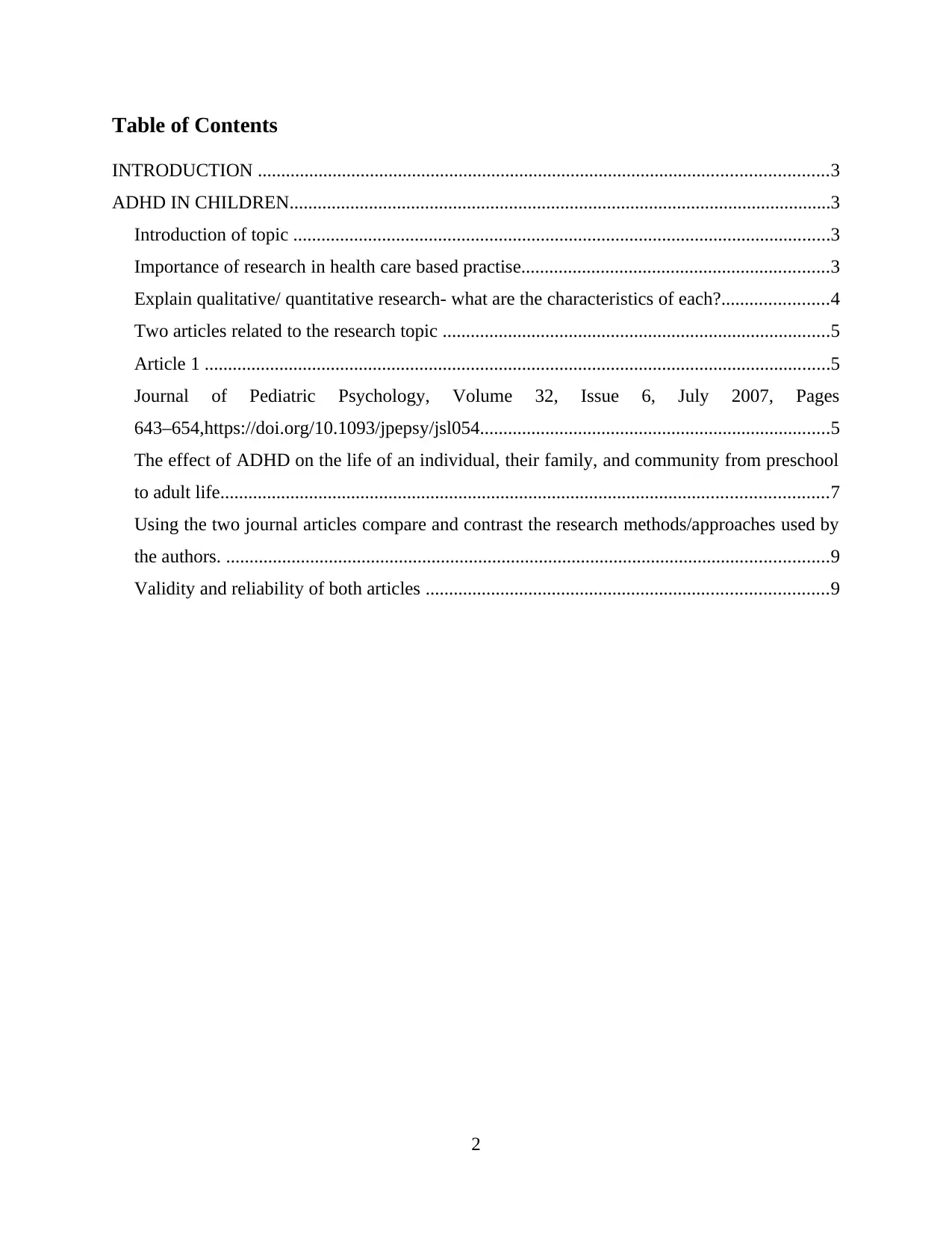
Table of Contents
INTRODUCTION ..........................................................................................................................3
ADHD IN CHILDREN....................................................................................................................3
Introduction of topic ...................................................................................................................3
Importance of research in health care based practise..................................................................3
Explain qualitative/ quantitative research- what are the characteristics of each?.......................4
Two articles related to the research topic ...................................................................................5
Article 1 ......................................................................................................................................5
Journal of Pediatric Psychology, Volume 32, Issue 6, July 2007, Pages
643–654,https://doi.org/10.1093/jpepsy/jsl054...........................................................................5
The effect of ADHD on the life of an individual, their family, and community from preschool
to adult life..................................................................................................................................7
Using the two journal articles compare and contrast the research methods/approaches used by
the authors. .................................................................................................................................9
Validity and reliability of both articles ......................................................................................9
2
INTRODUCTION ..........................................................................................................................3
ADHD IN CHILDREN....................................................................................................................3
Introduction of topic ...................................................................................................................3
Importance of research in health care based practise..................................................................3
Explain qualitative/ quantitative research- what are the characteristics of each?.......................4
Two articles related to the research topic ...................................................................................5
Article 1 ......................................................................................................................................5
Journal of Pediatric Psychology, Volume 32, Issue 6, July 2007, Pages
643–654,https://doi.org/10.1093/jpepsy/jsl054...........................................................................5
The effect of ADHD on the life of an individual, their family, and community from preschool
to adult life..................................................................................................................................7
Using the two journal articles compare and contrast the research methods/approaches used by
the authors. .................................................................................................................................9
Validity and reliability of both articles ......................................................................................9
2
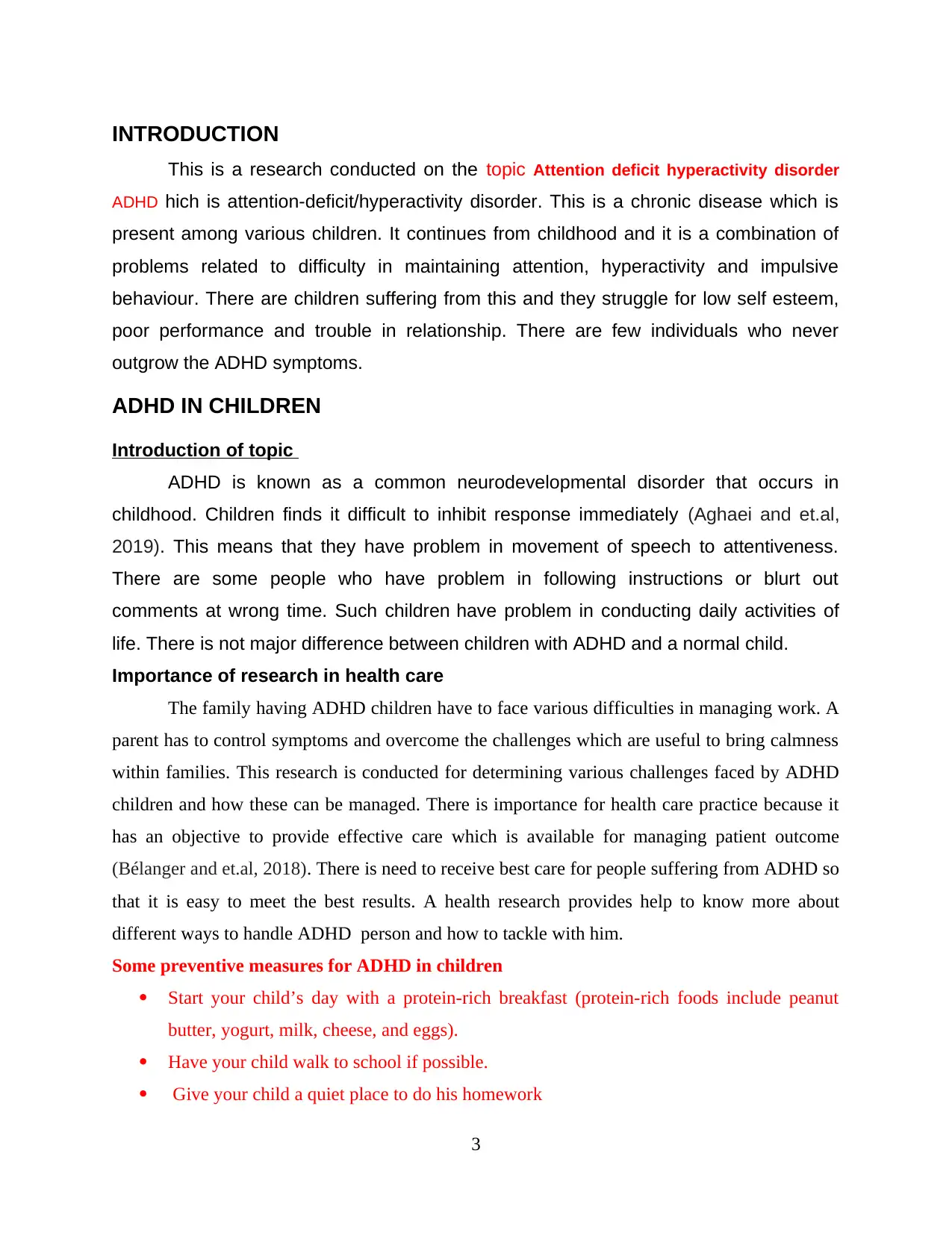
INTRODUCTION
This is a research conducted on the topic Attention deficit hyperactivity disorder
ADHD hich is attention-deficit/hyperactivity disorder. This is a chronic disease which is
present among various children. It continues from childhood and it is a combination of
problems related to difficulty in maintaining attention, hyperactivity and impulsive
behaviour. There are children suffering from this and they struggle for low self esteem,
poor performance and trouble in relationship. There are few individuals who never
outgrow the ADHD symptoms.
ADHD IN CHILDREN
Introduction of topic
ADHD is known as a common neurodevelopmental disorder that occurs in
childhood. Children finds it difficult to inhibit response immediately (Aghaei and et.al,
2019). This means that they have problem in movement of speech to attentiveness.
There are some people who have problem in following instructions or blurt out
comments at wrong time. Such children have problem in conducting daily activities of
life. There is not major difference between children with ADHD and a normal child.
Importance of research in health care
The family having ADHD children have to face various difficulties in managing work. A
parent has to control symptoms and overcome the challenges which are useful to bring calmness
within families. This research is conducted for determining various challenges faced by ADHD
children and how these can be managed. There is importance for health care practice because it
has an objective to provide effective care which is available for managing patient outcome
(Bélanger and et.al, 2018). There is need to receive best care for people suffering from ADHD so
that it is easy to meet the best results. A health research provides help to know more about
different ways to handle ADHD person and how to tackle with him.
Some preventive measures for ADHD in children
Start your child’s day with a protein-rich breakfast (protein-rich foods include peanut
butter, yogurt, milk, cheese, and eggs).
Have your child walk to school if possible.
Give your child a quiet place to do his homework
3
This is a research conducted on the topic Attention deficit hyperactivity disorder
ADHD hich is attention-deficit/hyperactivity disorder. This is a chronic disease which is
present among various children. It continues from childhood and it is a combination of
problems related to difficulty in maintaining attention, hyperactivity and impulsive
behaviour. There are children suffering from this and they struggle for low self esteem,
poor performance and trouble in relationship. There are few individuals who never
outgrow the ADHD symptoms.
ADHD IN CHILDREN
Introduction of topic
ADHD is known as a common neurodevelopmental disorder that occurs in
childhood. Children finds it difficult to inhibit response immediately (Aghaei and et.al,
2019). This means that they have problem in movement of speech to attentiveness.
There are some people who have problem in following instructions or blurt out
comments at wrong time. Such children have problem in conducting daily activities of
life. There is not major difference between children with ADHD and a normal child.
Importance of research in health care
The family having ADHD children have to face various difficulties in managing work. A
parent has to control symptoms and overcome the challenges which are useful to bring calmness
within families. This research is conducted for determining various challenges faced by ADHD
children and how these can be managed. There is importance for health care practice because it
has an objective to provide effective care which is available for managing patient outcome
(Bélanger and et.al, 2018). There is need to receive best care for people suffering from ADHD so
that it is easy to meet the best results. A health research provides help to know more about
different ways to handle ADHD person and how to tackle with him.
Some preventive measures for ADHD in children
Start your child’s day with a protein-rich breakfast (protein-rich foods include peanut
butter, yogurt, milk, cheese, and eggs).
Have your child walk to school if possible.
Give your child a quiet place to do his homework
3
⊘ This is a preview!⊘
Do you want full access?
Subscribe today to unlock all pages.

Trusted by 1+ million students worldwide
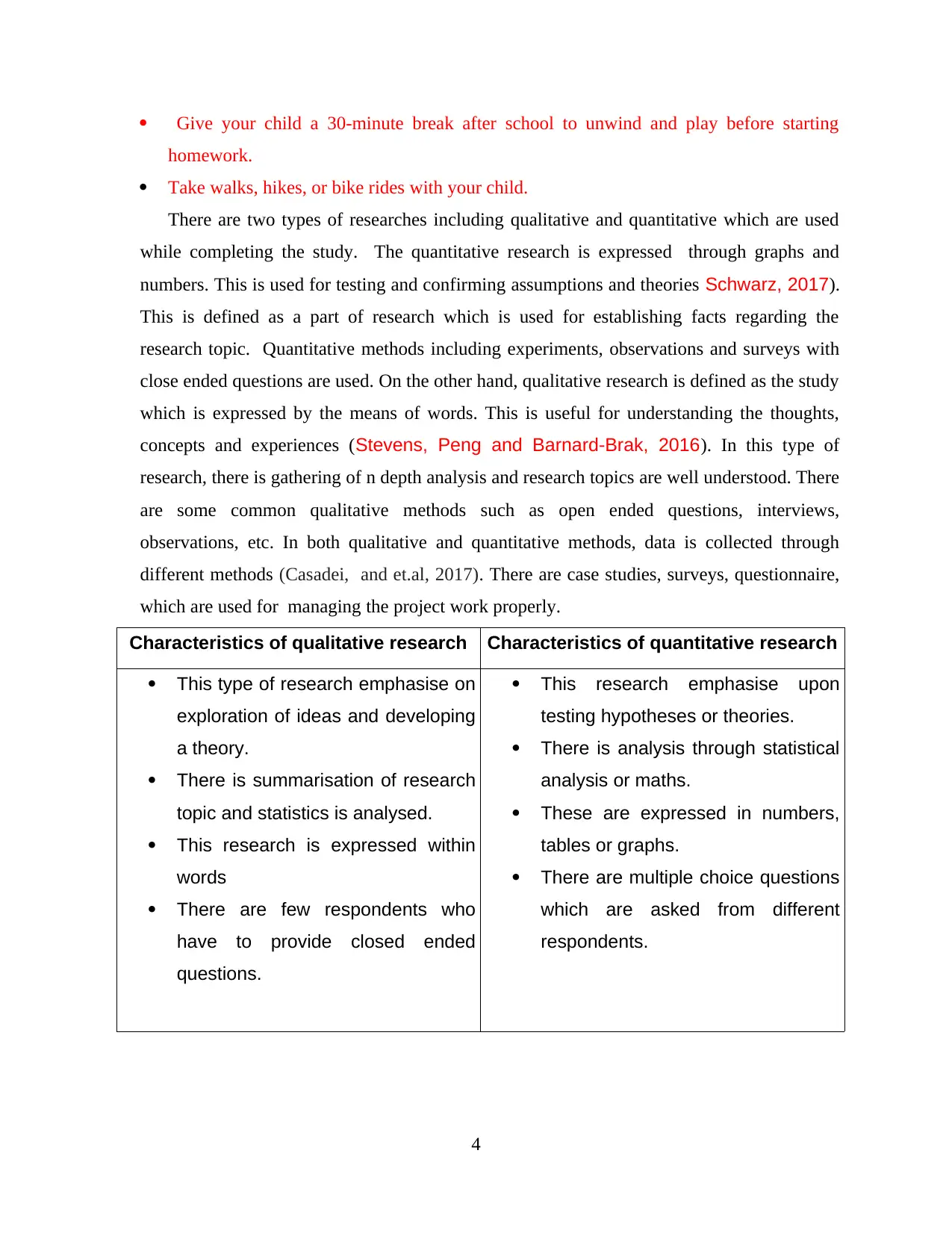
Give your child a 30-minute break after school to unwind and play before starting
homework.
Take walks, hikes, or bike rides with your child.
There are two types of researches including qualitative and quantitative which are used
while completing the study. The quantitative research is expressed through graphs and
numbers. This is used for testing and confirming assumptions and theories Schwarz, 2017).
This is defined as a part of research which is used for establishing facts regarding the
research topic. Quantitative methods including experiments, observations and surveys with
close ended questions are used. On the other hand, qualitative research is defined as the study
which is expressed by the means of words. This is useful for understanding the thoughts,
concepts and experiences (Stevens, Peng and Barnard-Brak, 2016). In this type of
research, there is gathering of n depth analysis and research topics are well understood. There
are some common qualitative methods such as open ended questions, interviews,
observations, etc. In both qualitative and quantitative methods, data is collected through
different methods (Casadei, and et.al, 2017). There are case studies, surveys, questionnaire,
which are used for managing the project work properly.
Characteristics of qualitative research Characteristics of quantitative research
This type of research emphasise on
exploration of ideas and developing
a theory.
There is summarisation of research
topic and statistics is analysed.
This research is expressed within
words
There are few respondents who
have to provide closed ended
questions.
This research emphasise upon
testing hypotheses or theories.
There is analysis through statistical
analysis or maths.
These are expressed in numbers,
tables or graphs.
There are multiple choice questions
which are asked from different
respondents.
4
homework.
Take walks, hikes, or bike rides with your child.
There are two types of researches including qualitative and quantitative which are used
while completing the study. The quantitative research is expressed through graphs and
numbers. This is used for testing and confirming assumptions and theories Schwarz, 2017).
This is defined as a part of research which is used for establishing facts regarding the
research topic. Quantitative methods including experiments, observations and surveys with
close ended questions are used. On the other hand, qualitative research is defined as the study
which is expressed by the means of words. This is useful for understanding the thoughts,
concepts and experiences (Stevens, Peng and Barnard-Brak, 2016). In this type of
research, there is gathering of n depth analysis and research topics are well understood. There
are some common qualitative methods such as open ended questions, interviews,
observations, etc. In both qualitative and quantitative methods, data is collected through
different methods (Casadei, and et.al, 2017). There are case studies, surveys, questionnaire,
which are used for managing the project work properly.
Characteristics of qualitative research Characteristics of quantitative research
This type of research emphasise on
exploration of ideas and developing
a theory.
There is summarisation of research
topic and statistics is analysed.
This research is expressed within
words
There are few respondents who
have to provide closed ended
questions.
This research emphasise upon
testing hypotheses or theories.
There is analysis through statistical
analysis or maths.
These are expressed in numbers,
tables or graphs.
There are multiple choice questions
which are asked from different
respondents.
4
Paraphrase This Document
Need a fresh take? Get an instant paraphrase of this document with our AI Paraphraser
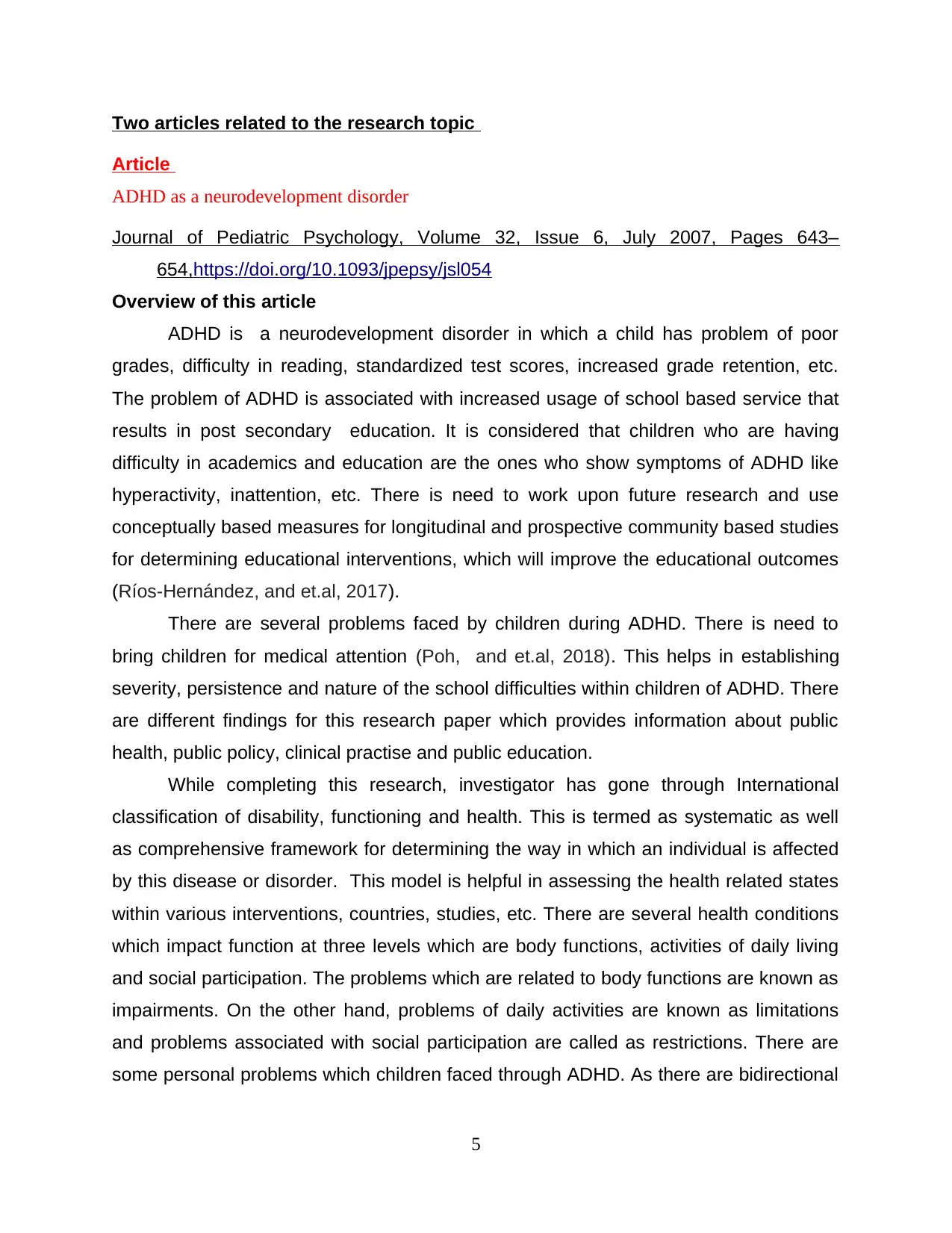
Two articles related to the research topic
Article
ADHD as a neurodevelopment disorder
Journal of Pediatric Psychology, Volume 32, Issue 6, July 2007, Pages 643–
654,https://doi.org/10.1093/jpepsy/jsl054
Overview of this article
ADHD is a neurodevelopment disorder in which a child has problem of poor
grades, difficulty in reading, standardized test scores, increased grade retention, etc.
The problem of ADHD is associated with increased usage of school based service that
results in post secondary education. It is considered that children who are having
difficulty in academics and education are the ones who show symptoms of ADHD like
hyperactivity, inattention, etc. There is need to work upon future research and use
conceptually based measures for longitudinal and prospective community based studies
for determining educational interventions, which will improve the educational outcomes
(Ríos-Hernández, and et.al, 2017).
There are several problems faced by children during ADHD. There is need to
bring children for medical attention (Poh, and et.al, 2018). This helps in establishing
severity, persistence and nature of the school difficulties within children of ADHD. There
are different findings for this research paper which provides information about public
health, public policy, clinical practise and public education.
While completing this research, investigator has gone through International
classification of disability, functioning and health. This is termed as systematic as well
as comprehensive framework for determining the way in which an individual is affected
by this disease or disorder. This model is helpful in assessing the health related states
within various interventions, countries, studies, etc. There are several health conditions
which impact function at three levels which are body functions, activities of daily living
and social participation. The problems which are related to body functions are known as
impairments. On the other hand, problems of daily activities are known as limitations
and problems associated with social participation are called as restrictions. There are
some personal problems which children faced through ADHD. As there are bidirectional
5
Article
ADHD as a neurodevelopment disorder
Journal of Pediatric Psychology, Volume 32, Issue 6, July 2007, Pages 643–
654,https://doi.org/10.1093/jpepsy/jsl054
Overview of this article
ADHD is a neurodevelopment disorder in which a child has problem of poor
grades, difficulty in reading, standardized test scores, increased grade retention, etc.
The problem of ADHD is associated with increased usage of school based service that
results in post secondary education. It is considered that children who are having
difficulty in academics and education are the ones who show symptoms of ADHD like
hyperactivity, inattention, etc. There is need to work upon future research and use
conceptually based measures for longitudinal and prospective community based studies
for determining educational interventions, which will improve the educational outcomes
(Ríos-Hernández, and et.al, 2017).
There are several problems faced by children during ADHD. There is need to
bring children for medical attention (Poh, and et.al, 2018). This helps in establishing
severity, persistence and nature of the school difficulties within children of ADHD. There
are different findings for this research paper which provides information about public
health, public policy, clinical practise and public education.
While completing this research, investigator has gone through International
classification of disability, functioning and health. This is termed as systematic as well
as comprehensive framework for determining the way in which an individual is affected
by this disease or disorder. This model is helpful in assessing the health related states
within various interventions, countries, studies, etc. There are several health conditions
which impact function at three levels which are body functions, activities of daily living
and social participation. The problems which are related to body functions are known as
impairments. On the other hand, problems of daily activities are known as limitations
and problems associated with social participation are called as restrictions. There are
some personal problems which children faced through ADHD. As there are bidirectional
5
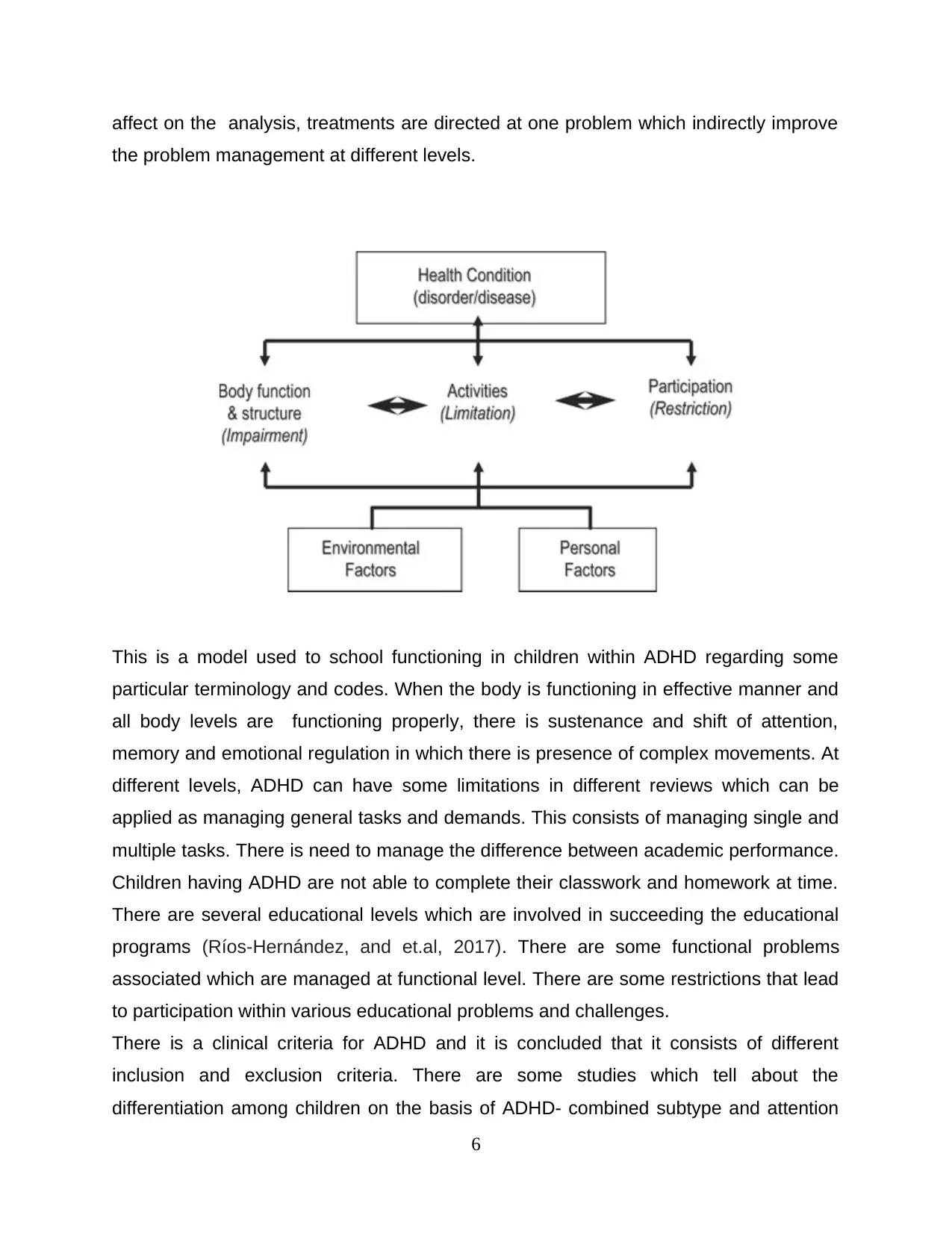
affect on the analysis, treatments are directed at one problem which indirectly improve
the problem management at different levels.
This is a model used to school functioning in children within ADHD regarding some
particular terminology and codes. When the body is functioning in effective manner and
all body levels are functioning properly, there is sustenance and shift of attention,
memory and emotional regulation in which there is presence of complex movements. At
different levels, ADHD can have some limitations in different reviews which can be
applied as managing general tasks and demands. This consists of managing single and
multiple tasks. There is need to manage the difference between academic performance.
Children having ADHD are not able to complete their classwork and homework at time.
There are several educational levels which are involved in succeeding the educational
programs (Ríos-Hernández, and et.al, 2017). There are some functional problems
associated which are managed at functional level. There are some restrictions that lead
to participation within various educational problems and challenges.
There is a clinical criteria for ADHD and it is concluded that it consists of different
inclusion and exclusion criteria. There are some studies which tell about the
differentiation among children on the basis of ADHD- combined subtype and attention
6
the problem management at different levels.
This is a model used to school functioning in children within ADHD regarding some
particular terminology and codes. When the body is functioning in effective manner and
all body levels are functioning properly, there is sustenance and shift of attention,
memory and emotional regulation in which there is presence of complex movements. At
different levels, ADHD can have some limitations in different reviews which can be
applied as managing general tasks and demands. This consists of managing single and
multiple tasks. There is need to manage the difference between academic performance.
Children having ADHD are not able to complete their classwork and homework at time.
There are several educational levels which are involved in succeeding the educational
programs (Ríos-Hernández, and et.al, 2017). There are some functional problems
associated which are managed at functional level. There are some restrictions that lead
to participation within various educational problems and challenges.
There is a clinical criteria for ADHD and it is concluded that it consists of different
inclusion and exclusion criteria. There are some studies which tell about the
differentiation among children on the basis of ADHD- combined subtype and attention
6
⊘ This is a preview!⊘
Do you want full access?
Subscribe today to unlock all pages.

Trusted by 1+ million students worldwide
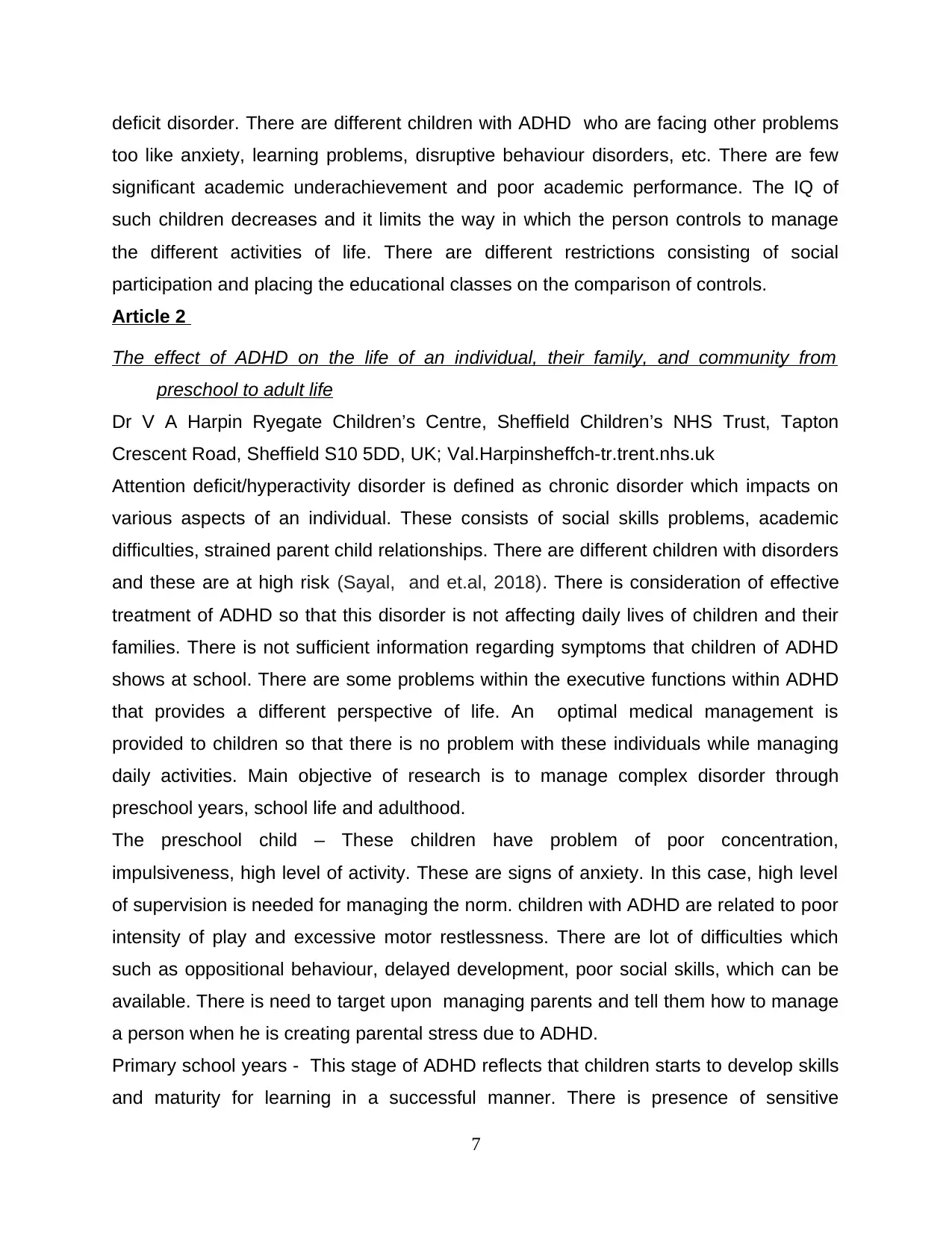
deficit disorder. There are different children with ADHD who are facing other problems
too like anxiety, learning problems, disruptive behaviour disorders, etc. There are few
significant academic underachievement and poor academic performance. The IQ of
such children decreases and it limits the way in which the person controls to manage
the different activities of life. There are different restrictions consisting of social
participation and placing the educational classes on the comparison of controls.
Article 2
The effect of ADHD on the life of an individual, their family, and community from
preschool to adult life
Dr V A Harpin Ryegate Children’s Centre, Sheffield Children’s NHS Trust, Tapton
Crescent Road, Sheffield S10 5DD, UK; Val.Harpinsheffch-tr.trent.nhs.uk
Attention deficit/hyperactivity disorder is defined as chronic disorder which impacts on
various aspects of an individual. These consists of social skills problems, academic
difficulties, strained parent child relationships. There are different children with disorders
and these are at high risk (Sayal, and et.al, 2018). There is consideration of effective
treatment of ADHD so that this disorder is not affecting daily lives of children and their
families. There is not sufficient information regarding symptoms that children of ADHD
shows at school. There are some problems within the executive functions within ADHD
that provides a different perspective of life. An optimal medical management is
provided to children so that there is no problem with these individuals while managing
daily activities. Main objective of research is to manage complex disorder through
preschool years, school life and adulthood.
The preschool child – These children have problem of poor concentration,
impulsiveness, high level of activity. These are signs of anxiety. In this case, high level
of supervision is needed for managing the norm. children with ADHD are related to poor
intensity of play and excessive motor restlessness. There are lot of difficulties which
such as oppositional behaviour, delayed development, poor social skills, which can be
available. There is need to target upon managing parents and tell them how to manage
a person when he is creating parental stress due to ADHD.
Primary school years - This stage of ADHD reflects that children starts to develop skills
and maturity for learning in a successful manner. There is presence of sensitive
7
too like anxiety, learning problems, disruptive behaviour disorders, etc. There are few
significant academic underachievement and poor academic performance. The IQ of
such children decreases and it limits the way in which the person controls to manage
the different activities of life. There are different restrictions consisting of social
participation and placing the educational classes on the comparison of controls.
Article 2
The effect of ADHD on the life of an individual, their family, and community from
preschool to adult life
Dr V A Harpin Ryegate Children’s Centre, Sheffield Children’s NHS Trust, Tapton
Crescent Road, Sheffield S10 5DD, UK; Val.Harpinsheffch-tr.trent.nhs.uk
Attention deficit/hyperactivity disorder is defined as chronic disorder which impacts on
various aspects of an individual. These consists of social skills problems, academic
difficulties, strained parent child relationships. There are different children with disorders
and these are at high risk (Sayal, and et.al, 2018). There is consideration of effective
treatment of ADHD so that this disorder is not affecting daily lives of children and their
families. There is not sufficient information regarding symptoms that children of ADHD
shows at school. There are some problems within the executive functions within ADHD
that provides a different perspective of life. An optimal medical management is
provided to children so that there is no problem with these individuals while managing
daily activities. Main objective of research is to manage complex disorder through
preschool years, school life and adulthood.
The preschool child – These children have problem of poor concentration,
impulsiveness, high level of activity. These are signs of anxiety. In this case, high level
of supervision is needed for managing the norm. children with ADHD are related to poor
intensity of play and excessive motor restlessness. There are lot of difficulties which
such as oppositional behaviour, delayed development, poor social skills, which can be
available. There is need to target upon managing parents and tell them how to manage
a person when he is creating parental stress due to ADHD.
Primary school years - This stage of ADHD reflects that children starts to develop skills
and maturity for learning in a successful manner. There is presence of sensitive
7
Paraphrase This Document
Need a fresh take? Get an instant paraphrase of this document with our AI Paraphraser
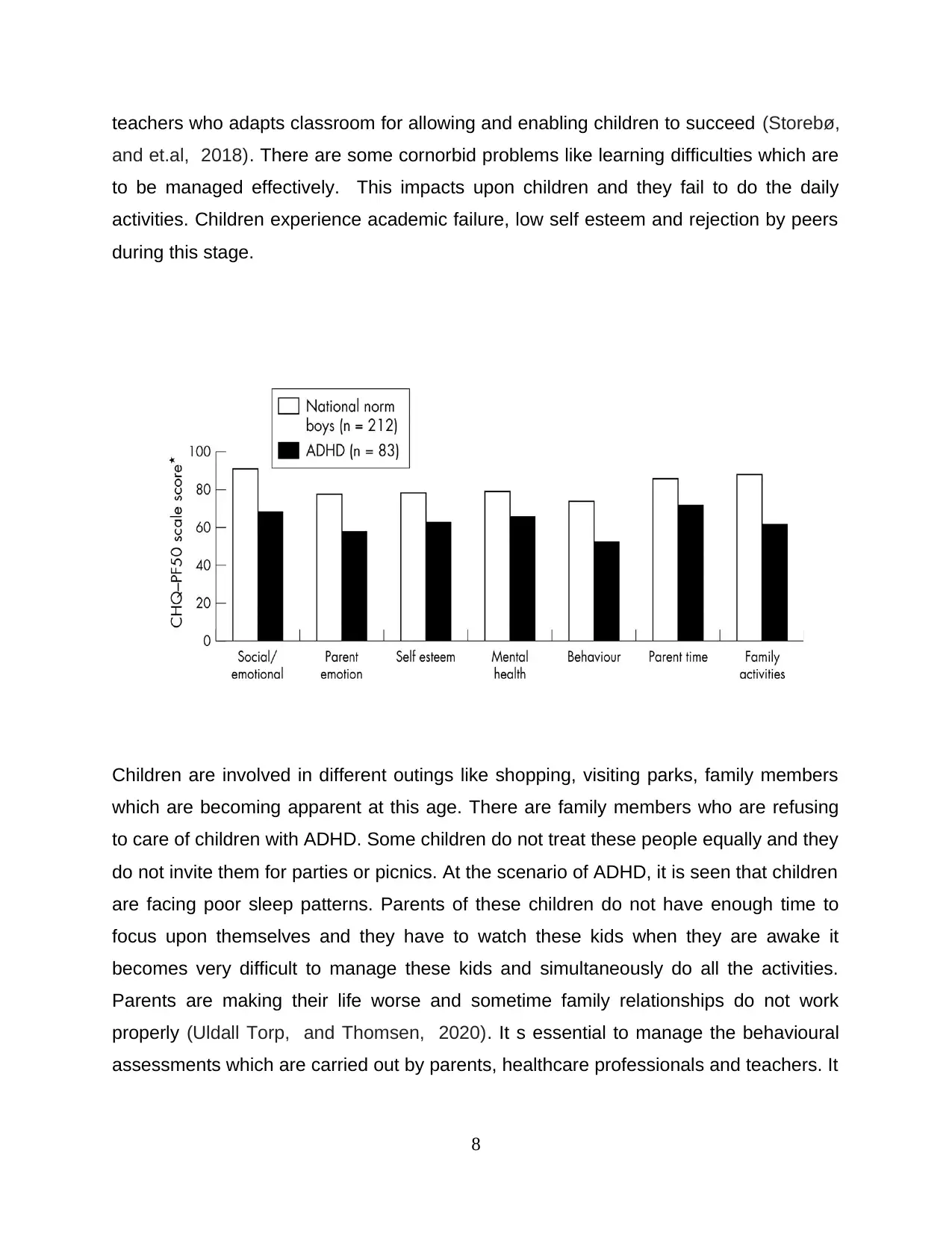
teachers who adapts classroom for allowing and enabling children to succeed (Storebø,
and et.al, 2018). There are some cornorbid problems like learning difficulties which are
to be managed effectively. This impacts upon children and they fail to do the daily
activities. Children experience academic failure, low self esteem and rejection by peers
during this stage.
Children are involved in different outings like shopping, visiting parks, family members
which are becoming apparent at this age. There are family members who are refusing
to care of children with ADHD. Some children do not treat these people equally and they
do not invite them for parties or picnics. At the scenario of ADHD, it is seen that children
are facing poor sleep patterns. Parents of these children do not have enough time to
focus upon themselves and they have to watch these kids when they are awake it
becomes very difficult to manage these kids and simultaneously do all the activities.
Parents are making their life worse and sometime family relationships do not work
properly (Uldall Torp, and Thomsen, 2020). It s essential to manage the behavioural
assessments which are carried out by parents, healthcare professionals and teachers. It
8
and et.al, 2018). There are some cornorbid problems like learning difficulties which are
to be managed effectively. This impacts upon children and they fail to do the daily
activities. Children experience academic failure, low self esteem and rejection by peers
during this stage.
Children are involved in different outings like shopping, visiting parks, family members
which are becoming apparent at this age. There are family members who are refusing
to care of children with ADHD. Some children do not treat these people equally and they
do not invite them for parties or picnics. At the scenario of ADHD, it is seen that children
are facing poor sleep patterns. Parents of these children do not have enough time to
focus upon themselves and they have to watch these kids when they are awake it
becomes very difficult to manage these kids and simultaneously do all the activities.
Parents are making their life worse and sometime family relationships do not work
properly (Uldall Torp, and Thomsen, 2020). It s essential to manage the behavioural
assessments which are carried out by parents, healthcare professionals and teachers. It
8
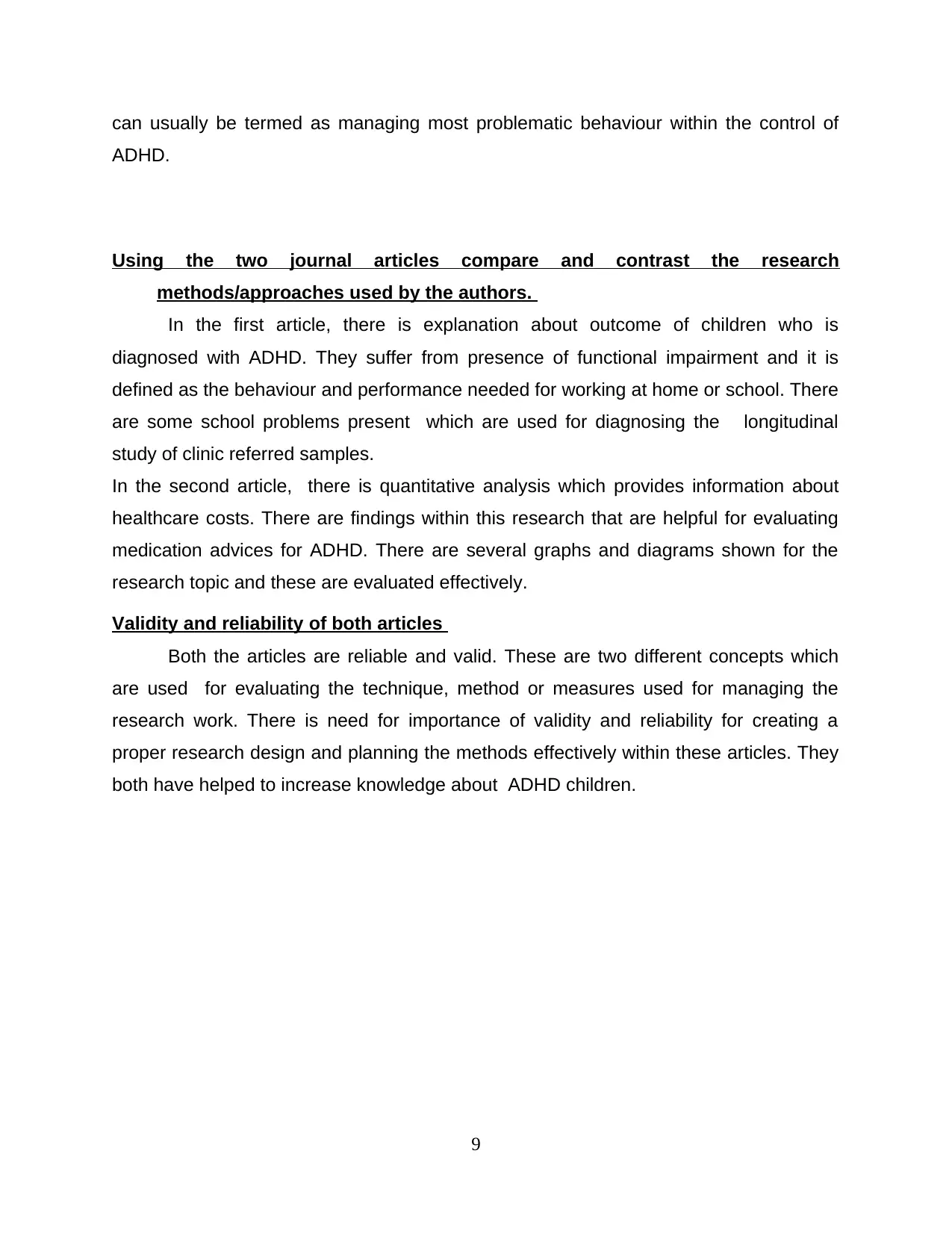
can usually be termed as managing most problematic behaviour within the control of
ADHD.
Using the two journal articles compare and contrast the research
methods/approaches used by the authors.
In the first article, there is explanation about outcome of children who is
diagnosed with ADHD. They suffer from presence of functional impairment and it is
defined as the behaviour and performance needed for working at home or school. There
are some school problems present which are used for diagnosing the longitudinal
study of clinic referred samples.
In the second article, there is quantitative analysis which provides information about
healthcare costs. There are findings within this research that are helpful for evaluating
medication advices for ADHD. There are several graphs and diagrams shown for the
research topic and these are evaluated effectively.
Validity and reliability of both articles
Both the articles are reliable and valid. These are two different concepts which
are used for evaluating the technique, method or measures used for managing the
research work. There is need for importance of validity and reliability for creating a
proper research design and planning the methods effectively within these articles. They
both have helped to increase knowledge about ADHD children.
9
ADHD.
Using the two journal articles compare and contrast the research
methods/approaches used by the authors.
In the first article, there is explanation about outcome of children who is
diagnosed with ADHD. They suffer from presence of functional impairment and it is
defined as the behaviour and performance needed for working at home or school. There
are some school problems present which are used for diagnosing the longitudinal
study of clinic referred samples.
In the second article, there is quantitative analysis which provides information about
healthcare costs. There are findings within this research that are helpful for evaluating
medication advices for ADHD. There are several graphs and diagrams shown for the
research topic and these are evaluated effectively.
Validity and reliability of both articles
Both the articles are reliable and valid. These are two different concepts which
are used for evaluating the technique, method or measures used for managing the
research work. There is need for importance of validity and reliability for creating a
proper research design and planning the methods effectively within these articles. They
both have helped to increase knowledge about ADHD children.
9
⊘ This is a preview!⊘
Do you want full access?
Subscribe today to unlock all pages.

Trusted by 1+ million students worldwide
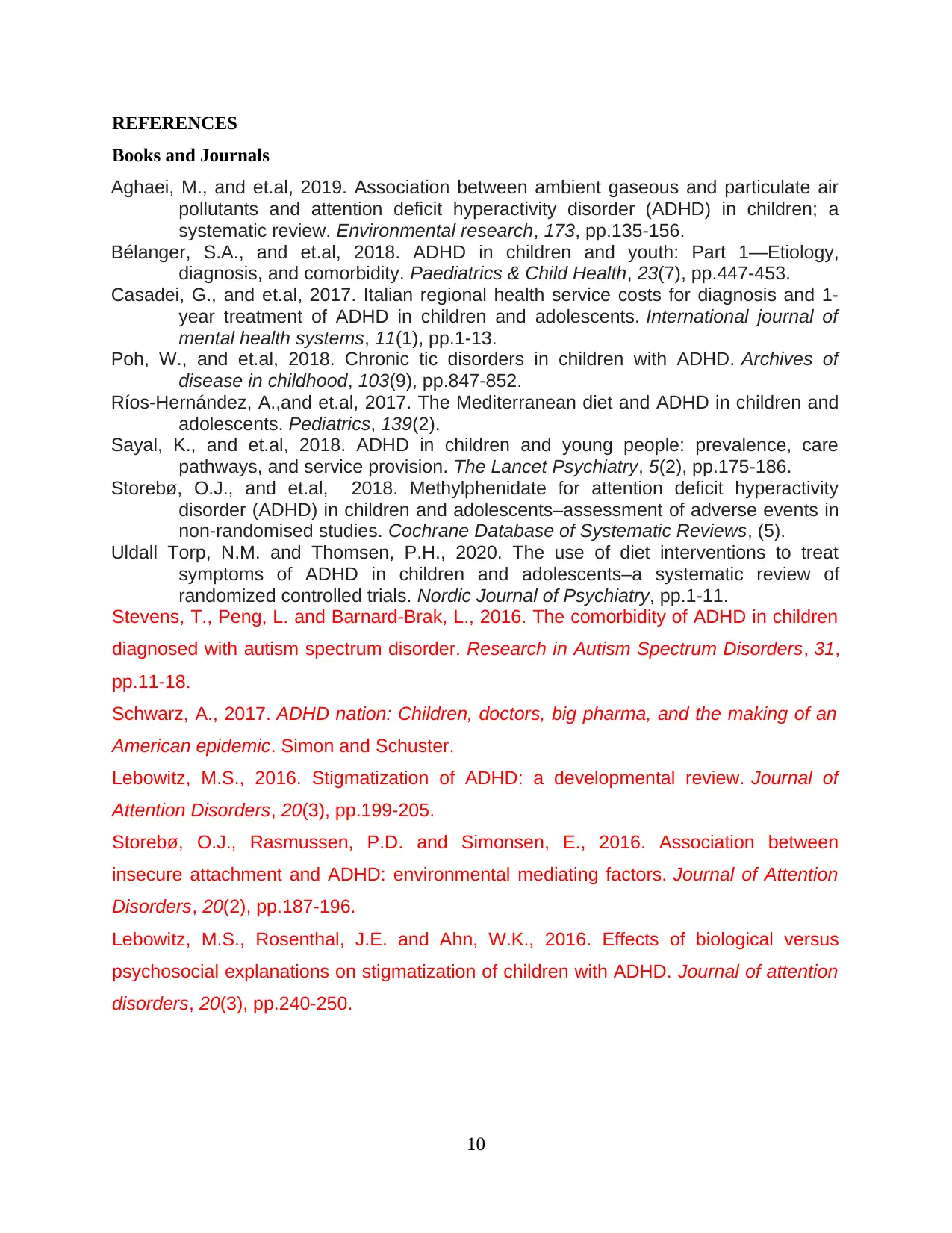
REFERENCES
Books and Journals
Aghaei, M., and et.al, 2019. Association between ambient gaseous and particulate air
pollutants and attention deficit hyperactivity disorder (ADHD) in children; a
systematic review. Environmental research, 173, pp.135-156.
Bélanger, S.A., and et.al, 2018. ADHD in children and youth: Part 1—Etiology,
diagnosis, and comorbidity. Paediatrics & Child Health, 23(7), pp.447-453.
Casadei, G., and et.al, 2017. Italian regional health service costs for diagnosis and 1-
year treatment of ADHD in children and adolescents. International journal of
mental health systems, 11(1), pp.1-13.
Poh, W., and et.al, 2018. Chronic tic disorders in children with ADHD. Archives of
disease in childhood, 103(9), pp.847-852.
Ríos-Hernández, A.,and et.al, 2017. The Mediterranean diet and ADHD in children and
adolescents. Pediatrics, 139(2).
Sayal, K., and et.al, 2018. ADHD in children and young people: prevalence, care
pathways, and service provision. The Lancet Psychiatry, 5(2), pp.175-186.
Storebø, O.J., and et.al, 2018. Methylphenidate for attention deficit hyperactivity
disorder (ADHD) in children and adolescents–assessment of adverse events in
non‐randomised studies. Cochrane Database of Systematic Reviews, (5).
Uldall Torp, N.M. and Thomsen, P.H., 2020. The use of diet interventions to treat
symptoms of ADHD in children and adolescents–a systematic review of
randomized controlled trials. Nordic Journal of Psychiatry, pp.1-11.
Stevens, T., Peng, L. and Barnard-Brak, L., 2016. The comorbidity of ADHD in children
diagnosed with autism spectrum disorder. Research in Autism Spectrum Disorders, 31,
pp.11-18.
Schwarz, A., 2017. ADHD nation: Children, doctors, big pharma, and the making of an
American epidemic. Simon and Schuster.
Lebowitz, M.S., 2016. Stigmatization of ADHD: a developmental review. Journal of
Attention Disorders, 20(3), pp.199-205.
Storebø, O.J., Rasmussen, P.D. and Simonsen, E., 2016. Association between
insecure attachment and ADHD: environmental mediating factors. Journal of Attention
Disorders, 20(2), pp.187-196.
Lebowitz, M.S., Rosenthal, J.E. and Ahn, W.K., 2016. Effects of biological versus
psychosocial explanations on stigmatization of children with ADHD. Journal of attention
disorders, 20(3), pp.240-250.
10
Books and Journals
Aghaei, M., and et.al, 2019. Association between ambient gaseous and particulate air
pollutants and attention deficit hyperactivity disorder (ADHD) in children; a
systematic review. Environmental research, 173, pp.135-156.
Bélanger, S.A., and et.al, 2018. ADHD in children and youth: Part 1—Etiology,
diagnosis, and comorbidity. Paediatrics & Child Health, 23(7), pp.447-453.
Casadei, G., and et.al, 2017. Italian regional health service costs for diagnosis and 1-
year treatment of ADHD in children and adolescents. International journal of
mental health systems, 11(1), pp.1-13.
Poh, W., and et.al, 2018. Chronic tic disorders in children with ADHD. Archives of
disease in childhood, 103(9), pp.847-852.
Ríos-Hernández, A.,and et.al, 2017. The Mediterranean diet and ADHD in children and
adolescents. Pediatrics, 139(2).
Sayal, K., and et.al, 2018. ADHD in children and young people: prevalence, care
pathways, and service provision. The Lancet Psychiatry, 5(2), pp.175-186.
Storebø, O.J., and et.al, 2018. Methylphenidate for attention deficit hyperactivity
disorder (ADHD) in children and adolescents–assessment of adverse events in
non‐randomised studies. Cochrane Database of Systematic Reviews, (5).
Uldall Torp, N.M. and Thomsen, P.H., 2020. The use of diet interventions to treat
symptoms of ADHD in children and adolescents–a systematic review of
randomized controlled trials. Nordic Journal of Psychiatry, pp.1-11.
Stevens, T., Peng, L. and Barnard-Brak, L., 2016. The comorbidity of ADHD in children
diagnosed with autism spectrum disorder. Research in Autism Spectrum Disorders, 31,
pp.11-18.
Schwarz, A., 2017. ADHD nation: Children, doctors, big pharma, and the making of an
American epidemic. Simon and Schuster.
Lebowitz, M.S., 2016. Stigmatization of ADHD: a developmental review. Journal of
Attention Disorders, 20(3), pp.199-205.
Storebø, O.J., Rasmussen, P.D. and Simonsen, E., 2016. Association between
insecure attachment and ADHD: environmental mediating factors. Journal of Attention
Disorders, 20(2), pp.187-196.
Lebowitz, M.S., Rosenthal, J.E. and Ahn, W.K., 2016. Effects of biological versus
psychosocial explanations on stigmatization of children with ADHD. Journal of attention
disorders, 20(3), pp.240-250.
10
1 out of 10
Related Documents
Your All-in-One AI-Powered Toolkit for Academic Success.
+13062052269
info@desklib.com
Available 24*7 on WhatsApp / Email
![[object Object]](/_next/static/media/star-bottom.7253800d.svg)
Unlock your academic potential
Copyright © 2020–2026 A2Z Services. All Rights Reserved. Developed and managed by ZUCOL.





